 I have family members who use their dishwashers as extra storage space for dishes, and I’ve never quite understood why they don’t take full advantage of this wondrous kitchen appliance. Others justify not owning a dishwasher at all for reasons that are, in many cases, based on incorrect assumptions, which I’ll call dishwasher myths.
I have family members who use their dishwashers as extra storage space for dishes, and I’ve never quite understood why they don’t take full advantage of this wondrous kitchen appliance. Others justify not owning a dishwasher at all for reasons that are, in many cases, based on incorrect assumptions, which I’ll call dishwasher myths.
For me, personally, I can’t imagine living without my dishwasher. While there are still lots of items I wash by hand, the dishwasher helps make kitchen clean-up much more efficient, saving me time that I’d rather be spending with my family, or simply relaxing after a well-cooked meal.
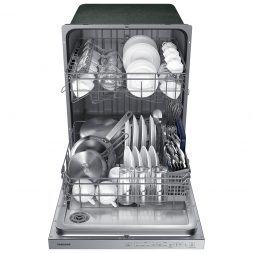 The many dishwasher myths might dissuade you from using one. Here, I’ll debunk some of the most common ones.
The many dishwasher myths might dissuade you from using one. Here, I’ll debunk some of the most common ones.
You need to pre-rinse your dishes before placing them in the dishwasher
This sounds counter-productive, doesn’t it? And in fact, it is. It’s actually better to leave gunk on your dishes before placing them in the dishwasher. This gives the powerful detergent and high-pressure water jets something to latch onto, and thus clean the dishes more effectively. If the jets don’t have much to clean, they can even end up being abrasive, and potentially damaging the dishware. So other than getting rid of large particles before placing a dish inside, let the dishwasher do the work it was meant to do!
Using a dishwasher is not eco-friendly
It’s more eco-friendly to wash by hand versus using a dishwasher, right? Wrong! You can actually end up using twice as much water when manually washing dishes, especially if you keep the water running as you scrub. Even if you don’t, you’ll have to wash especially 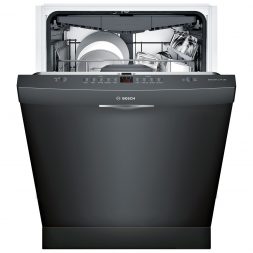 soiled dishes for longer, since the temperature of the water you use to wash by hand won’t be as hot as the temperature from the dishwasher. And the spray of water coming out of your faucet won’t be as powerful as the jets in a dishwasher. A dishwasher only needs a small amount of water, and electricity to heat the water. Most dishwashers come with an Energy Star rating, and some even have special energy-efficient wash cycle options if energy efficiency is a primary concern.
soiled dishes for longer, since the temperature of the water you use to wash by hand won’t be as hot as the temperature from the dishwasher. And the spray of water coming out of your faucet won’t be as powerful as the jets in a dishwasher. A dishwasher only needs a small amount of water, and electricity to heat the water. Most dishwashers come with an Energy Star rating, and some even have special energy-efficient wash cycle options if energy efficiency is a primary concern.
Dishwashers are filled with germs and bacteria
To be honest, plenty of items in your kitchen can be riddled with bacteria, from the sponge you use to hand wash items, to your countertops. Sure, the dishwasher can have some bacteria, but you’d probably find more in your kitchen sink through that wet towel you left hanging over the faucet, re-used sponges, and even in the drain. Dishwashers use strong cleaning agents and very hot steam, which can create a more sterile environment than you’d find in other places in your kitchen.
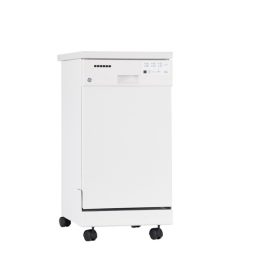 Dishwashers are only good for big families, and cleaning large loads
Dishwashers are only good for big families, and cleaning large loads
Not true. Not only do dishwashers come in many different sizes, including small ones for apartments, many of the latest models also have wash cycles that can accommodate small or half-loads. Adjust the cycle, or wait until the dishwasher is full before running it. A dishwasher can be just as handy for a single person as it is for a family of five.
You have to use the shortest cycles in order to save energy
Since many dishwashers are, as noted, Energy Star-rated, it means they are designed to be efficient. But you’re better off loading them and running the cycle you want versus using a short cycle for items that only need a light wash while you handwash items with caked on 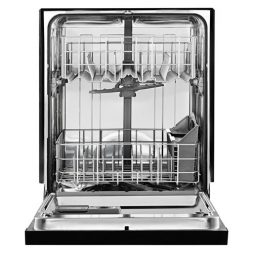
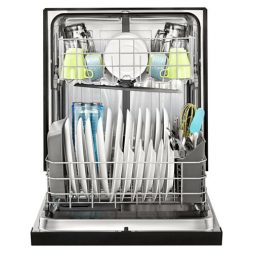 grime. Dishwashers were made to wash dishes that are tough to wash by hand, so why would you avoid using them for that very reason?
grime. Dishwashers were made to wash dishes that are tough to wash by hand, so why would you avoid using them for that very reason?
If you fill up the dishwasher, the items won’t be washed as well
This seems almost silly to believe, but many people think it’s true. While it’s never good to over-fill a dishwasher, they are sized in such a way as to offer ample space on different racks for a reason. Use them! If you don’t have a full load, some dishwashers can even sense how much is inside and adjust the water spray accordingly.
It’s better to add more detergent
Would you add extra detergent to your clothes if they were really soiled before running the washing machine? Probably not. So why would you consider this with a dishwasher? Using 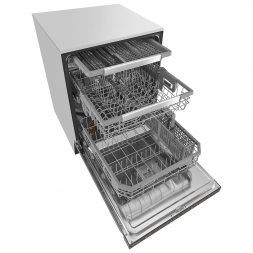 too much detergent can actually lead to cloudy dishes and glassware. Just use what’s needed, regardless of the soil level of the load. As the saying goes, a little goes a long way.
too much detergent can actually lead to cloudy dishes and glassware. Just use what’s needed, regardless of the soil level of the load. As the saying goes, a little goes a long way.
You can load a dishwasher any which way
Consult your owner’s manual for advice on how best to load a dishwasher. But some universal tips: always put cups and glasses on the top rack, along with things like dishwasher-safe plastic, and other items that might need just a delicate wash. Bowls should be placed on an angle so the water drains from them. The bottom rack is for things like pots, pans, and plates, loaded vertically, with the soiled side facing down, and space in between them. Put utensils in the dedicated holders, facing up, with the exception of sharp knives. If the dishwasher does not have a third rack, place tall cooking utensils, like spatulas, on the top rack, facing down.
A dishwasher will damage you flatware
Don’t go throwing your crystal glasses, fine China, sterling silver, or silver-plated utensils in a dishwasher; nor your good professional set of knives. It’s not meant to clean those 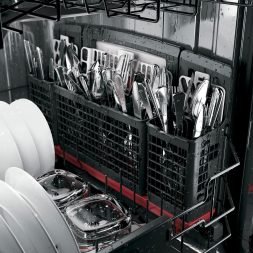 particularly delicate items, nor items like ceramic cookware and wooden cutting boards. But dishwashers are perfectly fine for everyday flatware, including forks, butter knives, and spoons.
particularly delicate items, nor items like ceramic cookware and wooden cutting boards. But dishwashers are perfectly fine for everyday flatware, including forks, butter knives, and spoons.
There’s no point in using a rinsing agent
Actually, there is. A rinsing agent helps make water roll off your dishes as opposed to leaving drops on them, thus helping prevent spots and streaks during the drying process. There’s nothing worse than a wine glass coming out of the dishwasher full of spots! So go ahead and throw in a capful of rinsing agent to eliminate those pesky water spots.
All detergent is made equal
You might have to try a few before you find one you like, but the general belief is that the powders and powder tablets are best for caked on food, while gels or pods are sufficient for everyday use. If you find your dishes aren’t coming out sparkling clean with gels or pods, an observation I’ve made myself, grab powdered tablets and try those instead. If you prefer gels and pods, still keep some powders and powdered tablets on hand to use for 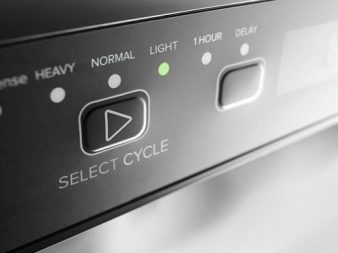 particularly tough loads.
particularly tough loads.
The dishwasher can’t clog, and doesn’t need cleaning
Your dishwasher probably drains into the same pipe as your kitchen sink, which means it can clog up. It also has a filter that requires cleaning every now and then to remove particles. Don’t forget to also give the interior the occasional wipe-down, including parts like hinges where food particles can hide and accumulate. You clean your oven, refrigerator, and microwave, after all, so why not also your dishwasher?
A dishwasher is only for dishes
Au contraire! Use a dishwasher for cleaning and/or disinfecting plenty of other items, like baby bottles and pacifiers, certain kids’ toys, kitchen sponges, cleaning brushes, toothbrushes, and more. Safely wash many pots and pans, too, not just dishes. Look for a  dishwasher-safe label, and/or use your best judgement.
dishwasher-safe label, and/or use your best judgement.
Bottom line about dishwashers
Families of all kinds are busy, and there isn’t enough time in a day to be constantly washing, drying, and putting away dishes after every meal; despite how great a bonding experience washing and drying dishes can be (sorry, I’d rather bond by breaking out a board game or relaxing with a couple glasses of wine after a meal!)
A dishwasher can ease the load (pun intended), and is a welcome addition to any kitchen. And, as noted in this article, many of the things you might have previously believed about them simply aren’t true. Dishwashers can accomplish a lot more than you realize (they aren’t for storage, folks!), and do so efficiently and effectively, so you can spend less time on cleaning, and more on cooking your delicious meals, and relaxing after indulging in them.
Check out lots of great dishwasher options at Best Buy Online.




I refuse to believe that I’ve wasted unnecessary time on rinsing. Rinsing shall always be a must no matter the cons!!
Comments are closed.